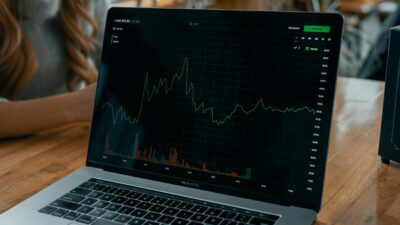Sandra Peter and Kai Riemer

The best books of 2020 on The Future, This Week
This week: generalising from unicorns, schadenfreude, self-help manifestos or true eye-openers, we review for you 2020’s best business books.
Sandra Peter (Sydney Business Insights) and Kai Riemer (Digital Disruption Research Group) meet once a week to put their own spin on news that is impacting the future of business in The Future, This Week.
The stories this week
01:40 – A closer look at the top business books of 2020
Other stories we bring up
The Fortune 10 (18) best business books of 2020
The Financial Times best business books of 2020
The McKinsey and FT 15 best business books of 2020
The Inc best business books of 2020
The Bloomberg best business books of 2020
strategy+business’s best business books of 2020
Our review of the “Social Dilemma” on The Future, This Week
Our previous conversations with Jevin West on calling bullshit and algorithms, and misinformation
Our previous conversation of the climate action with Chris Wright on The Future, This Week
Our previous discussion of the importance of science fiction on The Future, This Week
If Then: How the Simulmatics Corporation Invented the Future, by Jill Lepore
No Filter: The Inside Story of Instagram, by Sarah Frier
Calling Bullshit: The Art of Skepticism in a Data-Driven World, by Carl T. Bergstrom and Jevin West
Lead for the Planet: Five Practices for Confronting Climate Change, by Rae Andre
Follow the show on Apple Podcasts, Spotify, Overcast, Google Podcasts, Pocket Casts or wherever you get your podcasts. You can follow Sydney Business Insights on Flipboard, LinkedIn, Twitter and WeChat to keep updated with our latest insights.
Our theme music was composed and played by Linsey Pollak.
Send us your news ideas to sbi@sydney.edu.au.
Dr Sandra Peter is the Director of Sydney Executive Plus at the University of Sydney Business School. Her research and practice focuses on engaging with the future in productive ways, and the impact of emerging technologies on business and society.
Kai Riemer is Professor of Information Technology and Organisation, and Director of Sydney Executive Plus at the University of Sydney Business School. Kai's research interest is in Disruptive Technologies, Enterprise Social Media, Virtual Work, Collaborative Technologies and the Philosophy of Technology.
Share
We believe in open and honest access to knowledge. We use a Creative Commons Attribution NoDerivatives licence for our articles and podcasts, so you can republish them for free, online or in print.
Transcript
Disclaimer We'd like to advise that the following program may contain real news, occasional philosophy and ideas that may offend some listeners.
Kai So Sandra, it has come to this, the last episode of the season.
Sandra Are you asking me or telling me?
Kai Well I checked the calendar, this is the last episode of the season, of the year.
Sandra And we have been trying to prepare for this episode, while at the same time doing our late Christmas shopping.
Kai We shop online these days.
Sandra And as academics, of course, we gift books to everyone.
Kai But which books to gift? There are so many books. So, what do you do?
Sandra So we decided to combine the necessary with the useful…
Kai And had a closer look at what everyone else is reading, what everyone else is recommending we should read.
Sandra And that led us down a rabbit hole which we thought we would share with our listeners. So we went and read pretty much every list, not every book, but every list we could find of the top business books of the year. Best strategy books of the year,
Kai Best management books of the year,
Sandra Best leadership books of the year.
Kai And it turns out that going through those lists and looking at what kind of books everyone recommends is actually a pretty good snapshot of where the conversation is at. But also interesting to see what everyone is recommending, the kind of categories of books that people are interested in, and what doesn't make the lists.
Sandra And of course what makes our lists.
Kai And we have a few favourites, books that are on the list and books that are not on the list.
Sandra So let's do this.
Kai Let's do this.
Intro From The University of Sydney Business School, this is Sydney Business Insights, an initiative that explores the future of business. And this is The Future, This Week where Sandra Peter and Kai Riemer sit down every week to rethink and unlearn trends and technology in business. They discuss the news of the week, question the obvious and explore the weird and the wonderful.
Kai So Sandra, where do we start with this?
Sandra We read the recommendations from Fortune, from the Financial Times, from companies like McKinsey, from Inc.
Kai There was one in the Economist, one in Forbes,
Sandra One in Bloomberg, one in the Times, one in Strategy+Business, a whole lot of recommendations from various people.
Kai And we've asked a few friends to send us their recommendations as well. That doesn't answer my question, though, where do we start?
Sandra You're right, it was really hard to start because there was just so many books on this list. And even some of the lists that advertise ten business books, like the Fortune list, actually had 18 books on the ten best business books list. So they cheated. There were lists with up to 30 or 50 books on them. So probably a good place to start would be to categorise them in some way, and we've spent a bit of time on this.
Kai And we did some magic, secret sauce thinking coming up with a couple of categories. And it turns out that they're actually certain genres of books that make all of these lists, so we thought we guide you through them.
Sandra The first one and by far the biggest category that is always present on the best business books list, also a crowd pleaser, must be the one idea self help manifesto.
Kai That is typical airport literature, we do not recommend necessarily that you will frequent airports during these COVID times, but these are the typical books that you would find at the airport. They are books that present usually one self help idea and there are some lists which are full of these books. So you might want to check out the Fortune and the Inc top ten best business books lists.
Sandra And we'll put all the links as always in the shownotes.
Kai Fair warning though, you might want to pick those self help manifestos wisely because they do tend to contradict each other or give confusing advice if you were to read and follow all of them. But here's some examples.
Sandra Tiny Habits has been on many of these list, this is a book by BJ Fogg, who comes from the Behaviour Design Lab at Stanford and who's trying to help you achieve whatever goal you're aiming for next year.
Kai Other books are called What It Takes: Lessons in the Pursuit of Excellence or Digital Minimalism: Choosing a Focused Life in a Noisy World; self help tips to disconnect and, you know, find a more wholesome approach to meaningful work.
Sandra Also in that category, things like The Proximity Principle: The Proven Strategy That Will Lead to a Career You Love.
Kai Or Stillness Is the Key
Sandra How to get ahead by staying still.
Kai Exactly, learning from the stoics, you know, moving forward by being still and finding your inner calm.
Sandra And of course in this category besides the one idea manifestos, there are also the "just be nicer" books teach the act revealing the surprising power of the real you for greater success, or The Empathy Edge how, you know, putting yourself in other people's shoes, helps you better understand them.
Kai So this one takes our top spot in, you know, the 18 books in the top 10 list in Fortune. And turns out that with empathy, you become a better manager. There's some timeless wisdom there.
Sandra So all up a really big category in the one idea self help manifestos. But there was another category that always makes the top 10 business books lists, and that is…
Kai What we call "generalising from unicorns."
Sandra And this is never complete without some books about Amazon, Tesla, Netflix, Facebook, Instagram,
Kai A really interesting category. Usually these books feature one company, one really well known unique, very special, a very different company, and then tries to come up with broad learnings that are applicable to everyone.
Sandra And this year, both Fortune and the Financial Times had many of these books. Books like No Rules Rules: Netflix and the Culture of Reinvention, or No Filter, the inside story of how Instagram transformed business, celebrity and our culture.
Kai There was also a list in Forbes 10 mind opening business books for 2020 that had a couple of these books. For example, How Elon Musk and Company Made Electric Cars Cool, and Remade the Automotive and Energy Industries. So there's a mouthful, so learning from Elon, or Working Backwards, inside stories and secrets from inside Amazon.
Sandra There's also Facebook: The Inside Story to complement the No Filter, Instagram story, of course, Instagram being owned by Facebook.
Kai And then a couple of books that are non US-based, such as Samsung Rising, or The Haier Model about the Chinese tech giant making fridges, among other things.
Sandra And whilst we'll come back to some of these titles later on, it's important to note how on the one hand, it is really interesting to learn about how these companies have come to do what they do, and how their businesses changed over time and the role they played in shaping either the industry, shaping Silicon Valley, or even popular culture, or the way we interact, or other businesses. But at the same time, it's important to realise that many of the business lessons that these companies teach us are very difficult to implement in settings where other organisations might not be at the top of their food chain, as Amazon is or in the Netflix or Facebook, where the entire ecosystem of suppliers, users, customers, reorganise themselves around the top predator in that industry.
Kai So they make for really entertaining reads and also give a good insight into Silicon Valley and what it's like to work in some of these unicorns. But these books are really interesting precisely because these companies are so unique. And so we always have to be careful with how much we can actually generalise from these unique cases. But they can be good reads, I, for example, enjoyed reading Pumped, which is the book about Uber; that's, of course not from this year. So generally, I'm happy to delve into that genre, but more for the entertainment value and get a glimpse into the big tech world than to draw actionable insights for you know, application in our own lives or even in our own organisations.
Sandra And speaking of organisations, this is taking us straight to our next category:
Kai Books about failure, or what we term schadenfreude.
Sandra Books about how we rejoice when other organisations quite often fail publicly, and luckily, German does have a word for that.
Kai Again, schadenfreude. And the clear winner in that category, also featured in The New York Times in the best of 2020 is Billion Dollar Loser: The Epic Rise and Spectacular Fall of Adam Neumann and WeWork.
Sandra And WeWork has been on a downward spiral for quite a while. And I remember we talked quite a bit about WeWork on the podcast about a year and a half ago when they wanted to go public and they styled themselves not as a real estate company, but rather as a tech company with its mission to elevate the world's consciousness.
Kai Yeah, The New York Times points out a few other terms that Neumann invented to characterise WeWork as a tech enabled physical social network or a capitalist Kibbutz. So he had all these grandiose ideas for what was ultimately a company that was in real estate, being a landlord to short term tenants in its coworking spaces, heavily disrupted during COVID, of course, when socially distanced work took over.
Sandra But of course, it wasn't COVID that was the undoing of who WeWork but rather the≥
Kai The bullshit in the business model, as the book points out.
Sandra Also, in the failure category were books about banks, about Donald Trump books like Dark Towers: Deutsche Bank, Donald Trump, and an Epic Trail of Destruction.
Kai Which is the number one Wall Street Journal bestseller and also on the New York Times list. And I must say, I quite enjoy this category. A really good book not from this year was Bad Blood, of course, secrets and lies in a Silicon Valley startup, which charts the downfall of Theranos founder and CEO Elizabeth Holmes, so strongly recommended if you haven't read that one, makes for a good read.
Sandra Or the documentary.
Kai But continuing on with our categories In the same flavour is our category "Silicon Valley Kool-Aid."
Sandra Exactly what it says on the box, books that overhype, or over promise, or are full of buzzwords such as The Future Is Faster Than You Think: How Converging Technologies Are Transforming Business, Industries, and Our Lives.
Kai This one is by Peter Diamandis and Steven Kotler. Peter Diamandis, of course, the founder of Singularity University. And the book really starts with a narrative that is actually a few years old, which promises that AI and the Internet of Things and all these technologies will converge to bring about the singularities and the machines rising, snd if we're not careful, they're going to take over. So the narrative made us a little bit nostalgic, even for the early days of this podcast.
Sandra And whilst all of these books talk about the tsunami of change, the million year change that will happen in a decade and so on. Many of the insights do speak to ongoing transformations in industries, but quite often use hyperbole or exaggerate to make for easily shareable fridge magnetism is rather than exposing the complexity of many of the phenomena that they talk about.
Kai Fridge magnetism, bumper sticker-ism… but they do speak to a certain Silicon Valley narrative, was another book from Harvard Business Review Press, Competing in the Age of AI: Strategy and Leadership When Algorithms and Networks Run the World. Again, this one also comes along with a bit of hyperbole, but also points out many of the developments in the industry where machine learning, where AI, brings about transformations, we leave it up to the reader to decide whether those are false promises or real developments, the line is sometimes fairly fine.
Sandra Which brings us to our last two categories. And here there's a lot to like and possibly also to buy for this festive season. So our fifth category identified from the 10s of lists that we've gone through is the tech broccoli category, the "five a day," the good for you category.
Kai Books that are not necessarily surprising, but make really good and solid arguments about various aspects of change in business driven by technology.
Sandra So for example, How to Talk to Robots: a Girls' Guide to a Future Dominated by AI by Tabitha Goldstaub, who writes about the world of tech and the world of AI that has been, for a very long time, dominated by men and riddled with various biases, and in doing so follows books like Cathy O'Neil's Weapons of Math Destruction, and we'll include our interview with her in the showonotes, or Sophia Noble's Algorithms of Oppression.
Kai Both of which would also be in this category. And so Tabitha calls out both the fact that these technologies are usually created by young men but also that the data that is often used to train these algorithms contain inherent biases, many of which are gender biases. Another book in this category that I personally will read is Analogia: The Entangled Destinies of Nature, Human Beings and Machines, by George Dyson, who charts the history of how humans coexist with technologies that we less and less fully control or understand. So, to me quite a promising book that looks at how we are fundamentally technological beings.
Sandra which brings us very close to our last category, the true eye openers.
Kai So these books point out something that might have been right in front of us but not easy to see.
Sandra And quite often with these books, it's really difficult to tell which ones will really stand the test of time and become real classics.
Kai One such classic for example, from a few years back Tim Jackson's Prosperity without Growth: Foundations for the Economy of Tomorrow, making the argument for what a world would be like that is not obsessed with growth charting an alternative future.
Sandra This year, we've got Rebecca Henderson's Reimagining Capitalism: How Business Can Save the World. And this has been on the very, very shortlist from the Financial Times, from McKinsey, it's been on the Bloomberg list. And of course, many of the trends that Henderson picks up we've seen emerge over the past few years. She talks about the critical role of purpose driven businesses.
Kai She takes to court our obsession with maximising shareholder value and points out that we will have to reimagine capitalism to take note of the environmental realities of climate change, striving for social justice, or indeed, the fact that our democratic institutions are under threat from misinformation, and the realities of what we see in the US play out during the 2020 presidential elections.
Sandra But interestingly, in this category, there are books that seem to persist from one year to another and stay on the list even though they haven't been published that year. One such book has been, for the past four years, Capital in the Twenty-First Century, Thomas Piketty's tome, which some have compared to Marx's…
Kai Das Kapital
Sandra Likely the most bought and gifted and least read book, as it is a difficult read, but it's probably one of the most important economics books of the decade and Picketty obviously is an expert in income and wealth inequality, and tries to understand how wealth is created and dominates the economy in the 21st century. And we'd be remiss not to mention in this category of eye openers, the winner of last year.
Kai Which is of course Shoshana Zubov's Surveillance Capitalism, a true eye opener that points out how big tech business models no longer comply with our established notions of capitalism and therefore defy old school regulation.
Sandra In her attempt to redefine capitalism by looking at the behavioural surplus, the information that is traded for profits in new markets that are based on predicting our every need, or indeed, as she mentioned, producing our every need, will likely be one of the most important books of the decade, and one that we will continue to gift to people and reread as it is, again, a difficult but extremely important read.
Kai So that's been our six categories, and the most important entries as we can see them across the various lists that we've digested.
Sandra But that brings us to one very big omission from all the lists that we've seen this year. And that is anything pretty much on climate and sustainability. Whilst climate and sustainability were embedded in the argument of some of the books that we've seen on the list, unlike any of the past few years, only one book on one of the list was on climate change.
Kai And that is by Christiana Figueres and Tom Rivett-Carnac, The Future We Choose: Surviving the Climate Crisis, which basically is doing just that, charting ways in which humanity would have to change, in which business would have to contribute to avert what is now a looming crisis or emergency.
Sandra And while of course, there were quite a few books on climate this year, including David Attenborough's, A Life On Our Planet, or The Ministry for the Future, Resetting Our Future: What If Solving the Climate Crisis Is Simple, All We Can Save, we did contact our resident climate expert, Professor Chris Wright, and we did ask him what his top climate book of the year was.
Kai And he recommended Lead for the Planet: Five Practices for Confronting Climate Change by Rae André.
Sandra Which does balance out the severity of the climate crisis with the need for business and managers and governments to break out of the current inertia and confront the climate head on, and it's written in a quite accessible way for businesspeople.
Kai So a book that the two of us will have a closer look at as well.
Sandra As we take stock of all of these books and obviously give you our recommendations for all your nerdy friends, we'd be remiss not to remark that a lot of other things are missing. It strikes me that all these lists of business books of the year and recommendations for people in organisations to read, do seem to be just that, just business books. And there is a case to be made for big picture context books to make it on this list. And we've seen a few of them on the Bloomberg best books list. books like Caste: The Origins of Our Discontents by Isabel Wilkerson, who is also the Dean of the Wharton Business School at the University of Pennsylvania.
Kai Which really isn't your run-of-the-mill business book, right?
Sandra No, it is one of those eye opening books that looks at and tries to understand the caste system not only in India and Nazi Germany, but also in the United States. And it really turns on its head many of our understandings of how the narratives around race have been constructed and passed down not only in Europe and in India, but also in the United States, and how effective and insidious this caste system still is and influences how society is organised, including how business is organised.
Kai And of course, there's always a point to be made to engage with fiction or even science fiction books that make us think about our current world by painting pictures of possible future worlds that might be utopian, appealing, or dystopian; painting, the kind of words we might want to avoid.
Sandra And also reading fiction really does help people develop empathy, develop critical thinking, there's a lot of neuroscience research that suggests that that is the case and that some of the most valuable skills you might look for in candidates or people in your organisation to have things like self discipline, or self awareness, or creative problem solving, empathy, flexibility, are all things that research suggests that reading fiction is very good at enhancing.
Kai Which brings us to our recommendations for the holiday readings.
Sandra Little drum roll…
Kai Thanks, Megan
Sandra From everything we've seen on all the lists.
Kai so one that would be in the "generalising from unicorns" category is No Filter: The Inside Story of Instagram, which actually tops many of the lists, book by Sarah Frier, which basically charts the early days of Instagram, and then of course, the take over by Facebook, and how Instagram has become the phenomenon that it is today, so probably a really insightful read.
Sandra I'm curious to read it too because I think it promises to do a really good job at charting what happens when you start solving problems for business purposes or for profit, as opposed to the people who actually use your product, in this case, Instagram, which is what happened to many companies in Silicon Valley. And of course, this is a company that interacts with more than a billion of us each month. So all of us benefit from better understanding how the company developed and got to this point, including the acquisition by Facebook, which is now again under question.
Kai But there was another book on the list, which is a potential candidate for this year's eye opener.
Sandra And the book that actually topped the Financial Times list and the McKinsey list, and a few other ones. And that is, of course by Jill Lepore titled If Then: How the Simulmatics Corporation Invented the Future.
Kai So the Simulmatics Corporation was a company of the 1960s, who are credited with inventing data analytics in political campaigning, and was influential in getting President Kennedy elected and Lepore charts the history of that company, and marks it as the beginning of what has now become so dominant in big tech and the world around us, which is the use of data to manipulate people in advertising in political campaigning in the media.
Sandra So imagine that Cambridge Analytica type scandal, but in the 1960s.
Kai And Lepore makes the point that what we see now heavily critiqued in hearings in Congress isn't actually that new phenomenon, it has its roots much earlier than we tend to think.
Sandra And whilst there are questions about the actual ability of this company to do any of the things that it claimed that it can do back then, Lepore' argument is a good scaffold for understanding how we think today about predictive analytics about data collection, audience segmentation, and how these tactics have been framed in the way they enter political discourse or in the way they enter our business conversations.
Kai And so can we just suggest that if you want to get a real comprehensive insight into big tech and social media, then the two books, Lepore's If Then and the Instagram story combined with The Social Dilemma, the movie that we've discussed on the podcast a few weeks ago, make a really good intro with If Then being the prequel to The Social Dilemma and the Instagram story, kind of the secret to that story.
Sandra And then of course, as always, we'd recommend rounding this up with Shoshana Zubov's surveillance Capitalism.
Kai And then add to that mix one more book by a friend of the podcast.
Sandra And while technically this book wouldn't have made any of the lists this year because it was published not very long ago, and most of these lists are compiled based on books published up until about August, we'd be remiss not to call bullshit, so Carl Bergstrom and Jevin West's book, Calling Bullshit: The Art of Skepticism in a Data-Driven World.
Kai Which is a really good and practical guide to how to identify fake news, misinformation, and the kind of ways in which actors on social media and in the media try to bullshit us, technical term…
Sandra By using data in ways which are either manipulative, or provocative, or outright false. Carl and Jevin, of course, draw on their popular course at the University of Washington, and go through many topics, from selection bias to false causality, to many of the pitfalls of the big data and artificial intelligence movements, and hence a book that's–
Kai very much in the spirit of this podcast where we're sometimes taking great pleasure in calling bullshit on some of these claims about technology,
Sandra which is, as the authors define it, an important act in itself, the performative utterance in which one repudiates something objectionable, calling bullshit.
Kai And that is really all we have time for this year.
Sandra Thank you for listening in 2020.
Kai This was season eight, and we will be back with season nine in 2021,
Sandra Which hopefully will be a better year. Until then, happy holidays. We hope we helped with your Christmas shopping,
Kai And your Christmas reading at the beach if you're in Australia, or in a nice cosy warm place if you are overseas.
Sandra Thanks for listening.
Kai Thanks for listening.
Outro This was The Future, This Week, an initiative of The University of Sydney Business School. Sandra Peter is the director of Sydney Business Insights and Kai Riemer is professor of information technology and organisation. connect with us on LinkedIn, Twitter and Flipboard and subscribe, like or leave us a rating wherever you get your podcasts. If you have any weird and wonderful topics for us to discuss, send them to sbi@sydney.edu.au
Close transcript







